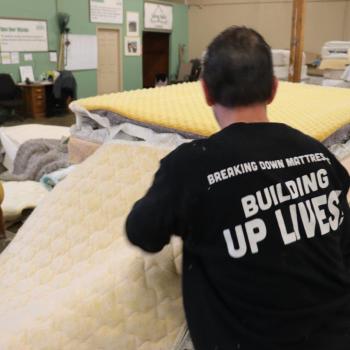This engagement is not represented as something easy—sometimes the apostles of Jesus prove to be unable to heal or exorcise a demon on their own—but it is nonetheless presented as something essential. Jesus does not leave the Gerasene demoniac wandering in graveyards in Mark 5, and he doesn't leave others who are "possessed" and not in their right minds uncared-for and walking the streets as, unfortunately, we often do.
Given its prominence in the Gospels, healing the demon-possessed seems to be as important as healing the blind, the lame, and those who cannot hear. It is as important as feeding the hungry. It is, like all these wonders, a sign of what Jesus has come to do, restoring those who are alienated from themselves and from their communities to some sense of wholeness and community.
It is a sign of the Kingdom of God coming near.
Since healing those who were alienated from themselves and their communities mattered to Jesus, it should matter to us. The mentally ill should not be ignored or marginalized, although both of these seem to be default settings for our culture. When we observe the massive budget cuts contemplated in many states that are attempting to balance their budgets on the backs of widows, orphans, and aliens, the ill and the mentally ill, we recognize that a vast disconnect exists between our religious teachings and our everyday lives. We must acknowledge that Jesus calls us to do certain things that we nonetheless seem to be unwilling or unable to do as a society.
This is the radical and ridiculous message of Jesus: we are called to love and to give to those who are less privileged, to sacrifice, to do those things that we do not wish to do. We are called, as Henri Nouwen said, to "downward mobility," a completely counter-cultural thing in a society where even a progressive Christian president like Barack Obama is forced to pay homage in his State of the Union address to the secular American myths of progress, profit, and upward mobility.
Thank goodness that his speech also acknowledged that all of us should be considered
part of the American family. We believe that in a country where every race and faith and point of view can be found, we are still bound together as one people.
One of the most horrifying things about mental illness is the feeling that you're alone in the world. And one of the most healing things is helping people feel that they are loved, supported, cared for. If Jesus healed the mentally ill and tried to bring them back into concord and community, we should think about how we might do the same. We should extend the necessary care, medical and psychological attention, to help them recover. We should pay attention to them instead of ignoring or marginalizing them because of their illness.
All of these things will be difficult. And expensive. And there may be no political will to do them. But, as I expect I will argue in future columns, just because something may be difficult and expensive doesn't mean it isn't also the right thing to do. Christian ethics, as we're seeing them unfold in this column and in the tradition, consistently call us to do what is best for others instead of what we perceive to be best for ourselves.
And with that challenge to you and to myself, I'll close. I'll see you here next week as we move on from Arizona to the challenges facing us in this near year. May God—Father, Son, and Holy Spirit—be with you today, this week, and forevermore.





